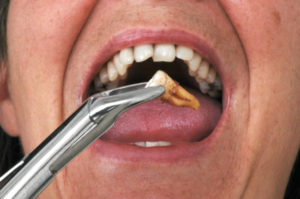If you have to take my tooth out, please do it gently
Dentists do whatever it takes (within reason) to prevent tooth extraction and save your teeth. The dental care they apply includes sealing the teeth fissures to prevent decay. They apply pastes rich in fluoride to early stage decay, to stop it progressing. They clean the decay out and fill the resulting cavity with dental materials or inlays and crowns. When the damage is more serious and if the tooth decay reaches the pulp, they try to save the tooth with root fillings. But when the damage is too great or when the tooth keeps causing abscesses and infections, despite all the dental work the dentist has put in, there is no other way but to extract the tooth.
Tooth extractions can vary in difficulty
Some of the main factors that determine whether an extraction is straightforward or complex:
- Tooth anatomy. Teeth with straight, short and single roots are easier to extract than teeth with long, curved multiple roots.
- Bone consistency. The softer the bone around the tooth, the easier the extraction. The younger the patient, the softer the bone is. The bone in the maxilla (upper jaw) is also softer than the bone in the mandible (lower jaw).
- How badly decayed or broken the tooth is. Dentists have their own techniques when extracting teeth and they also have very useful tools to do so. If general dentists deem the tooth too difficult to extract, they will refer the patient to a specialist dentist.
- Patients taking blood thinning medications. Patients who are taking blood thinning medications like: Apixaban, Rivaroxaban or Warfarin have to be treated with extra care. The bleeding after tooth extractions should be controlled. In some cases a consultation with the patient’s doctor is necessary and the medication may be stopped a few days before and after the extraction. If stopping the medication poses a high risk to the patient’s general health, the dentist could still carry out the extraction, but the extraction socket should be sutured carefully to prevent bleeding and to help the healing.
- Patients taking Alendronic Acid (Bisphosphonates). Alendronic Acids are known to decrease bone-cell activity. This medication is usually prescribed to patients suffering from osteoporosis. It inhibits bone resorption and that prevents the bones in the body from getting weaker, it also changes the metabolism in the jaw bone. The exposed bone that is left in the socket of the extracted tooth does not behave in a normal way. The bone does not heal easily due to the reduced metabolism caused by the Alendronic acid and that makes the healing process much slower. In some cases, the bone will necrotise (die) causing an open wound and a higher risk of infections.
- Root fractures. Sometimes the root of the tooth is fractured due to trauma. This happens often in the front teeth area after trauma due to accidents or when people faint. The root then needs to be extracted surgically, where the dental surgeon has to remove bone to get access to the root.
- Patients with reduced immune systems: some patients may be on medications that suppress the immune system. This could be due to organ transplant, a patient suffering from Human Immunodeficiency Virus (AIDS) or other conditions. Dentists should assess the situation and try to reduce the risk of infection to the patient during the tooth extraction procedure.
Aftercare advice given to patients
The extraction site will be sore for a week or two and possibly for longer. The amount of pain and soreness depends on how big the removed tooth was. Also the number of teeth extracted and how much bone was removed during the surgical procedure. The patient can take painkillers to help manage the pain but should not take Aspirin as this will make the blood thinner and prolong the healing process. After an extraction the socket will fill up with blood. The blood will form a clot, filling and protecting the socket.
- Try not to dislodge the clot as this will lead to dry socket. Dry socket is a painful condition that can take a few weeks to heal.
- The day after the extraction start rinsing gently with salt water, once or twice a day. Rinse gently so you don’t dislodge the clot inside the extraction socket
- If you are a smoker, try not to smoke for a few hours immediately after the extraction. Even better if you do not smoke for a few days. Smoking causes the small capillaries in the gum to close up making the area less nourished in blood. By stopping smoking, you will encourage the blood supply to flow to the extraction site enhancing the healing process.
- Avoid eating on the extraction side for a few days to avoid food particles ending up in the socket.
Most of the dental care you receive in dental practices is focused on saving teeth and preventing extractions.
By attending regular exams at your dental practice, your dentist will do his/her best to provide the dental care your teeth need to stay in your mouth munching on and smiling.

